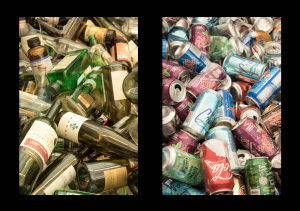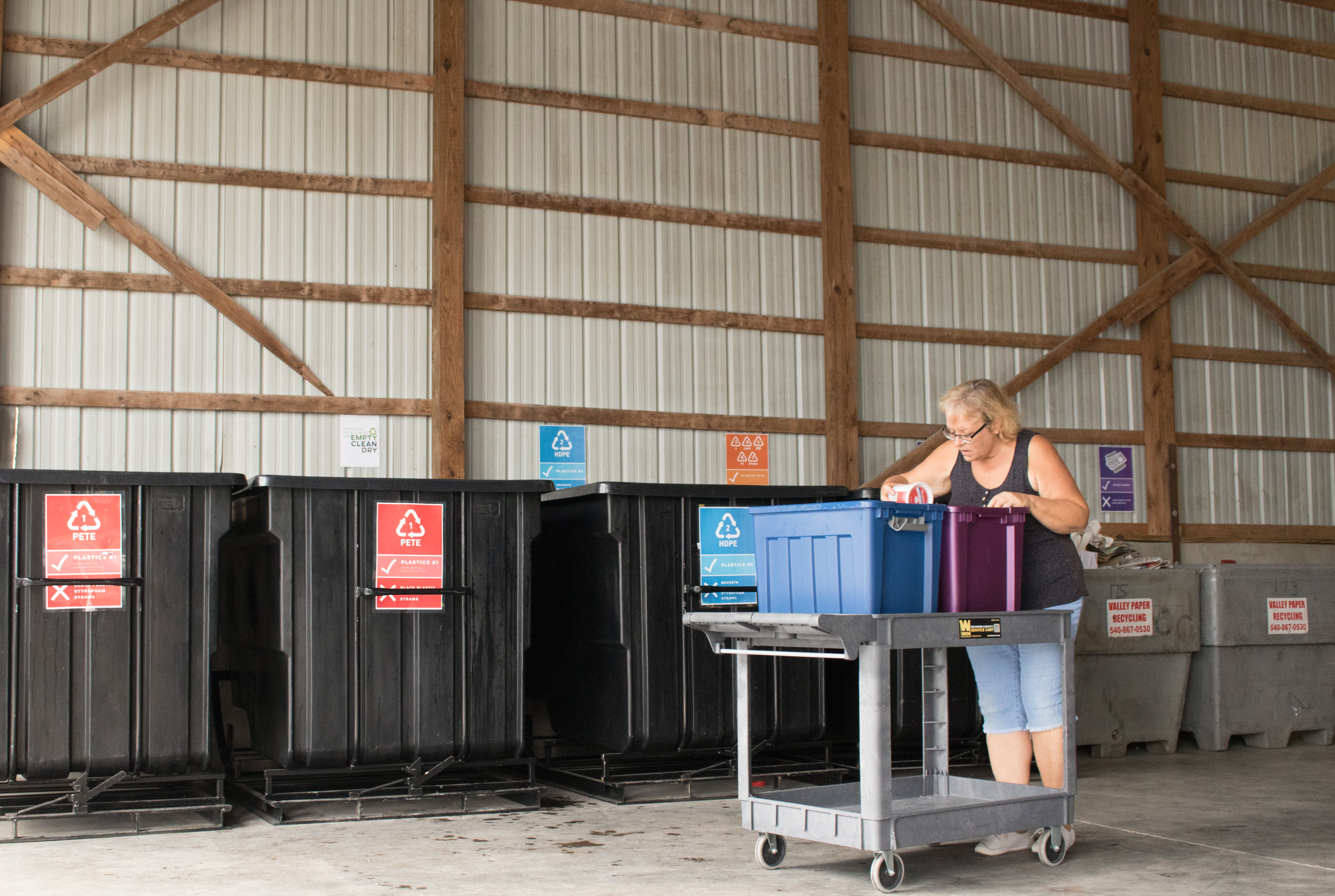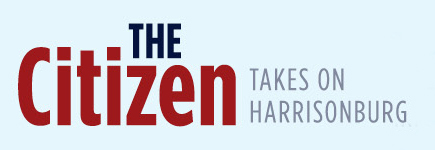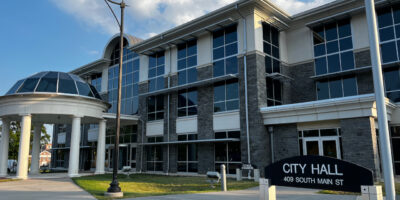By Bridget Manley, contributor
Harrisonburg resident Brent Woodruff and his family now have a mini recycling operation in their kitchen closet at home.
“We have separate containers for each container that they have at the recycling center —one for each different kind of plastic, paper, metal and glass” he said. “Then I take those containers into my Jeep so that all I have to do is dump them out when I get there.”
Woodruff and his wife Celes were disappointed when the Solid Waste and Single Stream Collection Program in Harrisonburg abruptly ended in March – a local consequence of circumstances involving Chinese government regulations and international economic forces.

The colorful bottles and cans fill the glass and aluminum bins at the Beery Road Recycling Convenience Center.
To handle Harrisonburg residents’ pent-up demand to recycle, the city set up a voluntary collection program at its facility on Beery Road off of Erickson Avenue. Residents, such as the Woodruffs, must place materials in specific bins for aluminum, steel, cardboard, mixed paper and glass—and even by the type, or number, of plastics. Drink bottles are “No. 1” plastics while milk jugs are “No. 2,” for instance.
Harsit Patel, Business Services Manager of the Public Works Department in Harrisonburg, said Harrisonburg officials have since examined how to best spend taxpayer dollars for waste collection and recycling. For now, Patel said, an employee-managed recycling collection center is the best option, and there is no plan to bring curbside pick-up back to the city anytime soon.
Instead, the city is trying to figure out how to expand voluntary collection options. The Public Works department is compiling data, such as the number of people who drop off their materials on Beery Road and the participation rate. And the department plans to look at the success of the new program early next year.
“We need to make sure it’s sustainable for the long term,” Patel said. “We need to make sure we can afford it without constantly having to raise fees.”
On Saturday, Oct. 13, the city’s recycling mobile unit will set up at the Farmers Market. Other city events will also include the recycling mobile unit. In addition, city officials are asking anyone interested in updates about the Harrisonburg recycling program to follow the city’s Facebook page and sign up for the city newsletter.
And Harrisonburg officials have received hundreds of responses from a voluntary survey in August that overwhelmingly shows Harrisonburg residents want a city recycling program. Patel shared some of those findings with The Citizen.
Survey shows high demand
The city received more than 540 responses from residents to the survey, Patel said.
Public Works officials reported their findings to the city Environmental Policy Standards Advisory Committee in late September. Among the highlights: 75% of survey respondents say they use the Recycling Convenience Center, while the remaining respondents either don’t recycle or divert waste in other ways, such as using a private recycling service, composting and/or donating unwanted items.
In addition, Patel says that 97% of respondents said they believe it’s important for Harrisonburg to have a recycling program. The majority said they preferred email and social media to receive refuse and recycling updates.
Other trends from open-ended questions included:
- Most respondents wanted curbside collection reinstated.
- Many asked for extending the recycling convenience center’s hours (8 a.m.–4 p.m. Monday through Friday and 8 a.m.–noon Saturday) and for additional recycling locations.
- Others suggested enhancing public education programs to promote reducing, reusing and then recycling, and increased promotion of the city’s programs.
The city plans to invest in education and marketing in hopes of increasing participation as part of the city’s long-term plan, Patel said.
The survey also revealed that many respondents didn’t know how to recycle other items, such as scrap metal, appliances and batteries, which the Beery Road Recycling Convenience Center accepts. Other household hazardous materials, such as motor oil and paints, are collected twice a year at the Rockingham County Landfill with the next collection date scheduled for Oct. 20 from 8 a.m.–noon.
Patel said that the survey is part of a larger initiative to gain input from all areas of the city, and will be having a meeting with city businesses and restaurants in the coming weeks to discuss their part in city recycling. Harrisonburg businesses have to pay the city by the pound for trash removal, so Patel said many of them are eager to learn about more recycling options.

Deb Fitzgerald, Harrisonburg City Public Schools board member, sorts through plastics during a recycling run Saturday, Oct. 6.
Looking for a better way
Patel was excited in 2015 to take the city from a curbside recycling pick-up program to single stream trash and recycling.
After dealing with major problems in the city’s recycling program a decade ago, Public Works officials thought they had found the solution a three-fold problem with the curbside program:
- Participation was already low, with only about 35-40% of city residents taking part.
- Market prices for recyclable goods started declining. In 2009, the city fetched about $.29-a-pound for No. 1 plastics – the kind that makes up drink bottles and common food containers. But by 2013, the price fell to $.04 a pound.
- The city was losing out on the most valuable recyclable material: aluminum.
“We were running a million-dollar program, and the item that paid us the most, we couldn’t even get,” Patel said.
In the wake of the recession that began in 2008, people looking to make extra cash would scour curbside bins in the middle of the night and take all the aluminum – the only material that proved to be consistently profitable for the city.
This also led to another problem for officials: the bins would be picked through so fast that the rest of the recycling would end up all over the streets. Patel said city officials started hearing from angry residents.
“They would call complaining,” he said. “They initially thought animals were getting into [the recycling], but then they figured out that people were stealing their stuff. It just became a big mess.”
It was a much bigger problem for the city than they expected. Multiple groups of people were out in the wee hours of the morning stealing the aluminum.
It became such an issue that city officials looked into legal solutions, but the assistant commonwealth attorney informed officials there weren’t many legal options to pursue.
The curbside recycling program was costing the city around $1 million a year, and the revenue collected was only about $50,000 yearly. City officials knew it wasn’t a sustainable solution.
Why single stream got trashed
Van Der Linde Recycling, located in Troy, Virginia, opened in 2008 with a multimillion-dollar facility that separated solid waste and recycling, using both automation and workers. Many cities and municipalities in Virginia were quick to switch their programs to the facility.
The idea was appealing: Harrisonburg would save money with a single stream program, and everyone in the city would be recycling. City officials were thrilled with the results. Van Der Linde’s $40 million dollar facility would bale the recyclables and market them to countries that wanted to purchase the baled raw material. Municipalities would receive a tipping fee for the recyclables and recycling rates would go up.
“Single stream worked for about three years until this hit that everyone took globally, not just locally and nationally,” Patel said.
China had always been one of the biggest purchasers of recycled materials, and Van Der Linde sold the materials to Chinese companies. As the biggest manufacturer in the world, China was able to take recyclables from other countries, break them down into raw materials, and use them in new products. This was lucrative for the country to remain the top manufacturer in the world, however, industrial pollution caused increasing health problems, especially in China’s manufacturing-heavy urban areas.
NPR reported that in 2017, China announced a crackdown on tainted plastic, and said it would no longer be taking in the massive amounts of recyclables from around the world.
“Since single stream means trash and recycling mixed together, there’s a lot of cross contamination in the trash bags,” Patel said. “Quality at the time was not as big of an issue as quantity was.”
When the ban went into place in January 2018, it had an immediate effect on the price of recyclables at Van Der Linde. The company was out of the single stream business March, although they did keep their construction materials recycling program.
‘Back to basics’
When the city received the news that Van Der Linde was closing the single stream operation, the city Public Works Department scrambled to find a way to continue a recycling program.
“It made it tough for the localities to deal with,” Patel said. “You have a budget to work with, you have passionate citizens who really want to recycle, and cities want to provide that because we don’t want it to go to the landfill either.”
Despite China’s decision, Patel and other city officials hoped other countries would step up to buy more recyclable material.But that didn’t happen on a large enough scale.
“We said ‘hey, can you take this for free so we don’t have to dump it in the landfill.’ That’s how we started off until we could figure out how we were going to do this,” Patel said. They did not know what the participation levels were going to be and how they would market the new program, all the while hoping China would change their regulations back.
In the months since, China has implemented even stricter regulations on all kinds of recyclables, and Patel does not think that they will reverse course anytime soon.
One positive outcome: the quality of the recycled materials dropped off at the Beery Road facility is better because the items are not covered in garbage and are already sorted. That saves the city money in the long run.
Regardless of what happens with the international industrial recycling market, Brent and Celes Woodruff say they’ll still sort their bottles, cans and cardboard to haul to Beery Road.
“I would never stop recycling because I think it’s the right thing to do,” said Woodruff, whose family participates in recycling together. “Harrisonburg was one of the only places I’ve lived with a recycling program, and so I am used to sorting and dropping off my recycling on my own. I hope the city will bring it back because of the convenience.”
Related resource:
Your Recycling Gets Recycled, Right? Maybe, or Maybe Not









